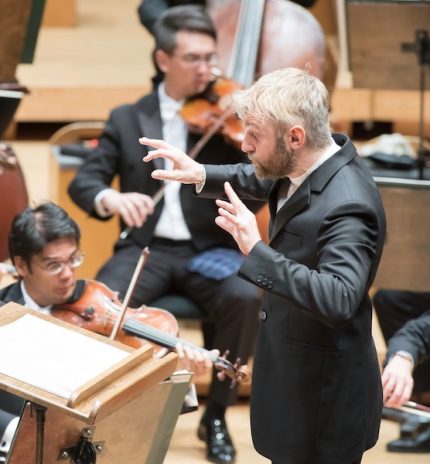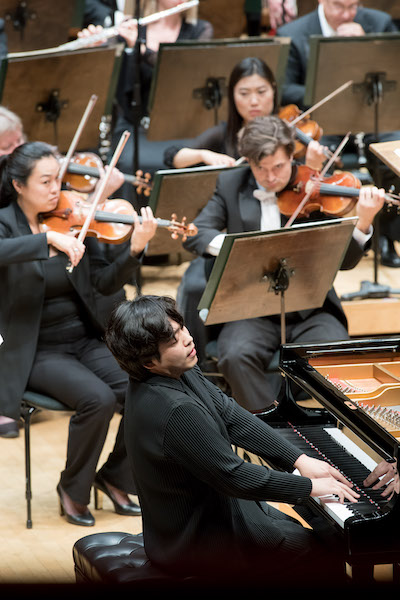Two impressive CSO debuts and a rousing Polish rarity

It’s not often that one encounters two artist debuts in a single Chicago Symphony Orchestra subscription concert. Nearly as rare are premieres of works by composers as frequently programmed as Mendelssohn and Prokofiev.
Yet such was the case Thursday night at Symphony Center where conductor Kirill Karabits made an impressive podium debut leading the CSO in a nicely varied program that avoided the usual repertorial suspects.
In what is becoming an unsettling trend at Orchestra Hall this season, turnout was again decidedly light. It seems like the most interesting programs presented by the CSO are drawing the smallest audiences, even with mostly familiar composer names on the menu.
The principal work of the evening was Witold Lutoslawski’s Concerto for Orchestra.
Completed in 1954, the work is clearly modeled on Bela Bartok’s mainstay of the same name, albeit often in less obvious ways. The work was written in the Polish composer’s early, more nationalist style, wherein a traditional folk-based idiom was less likely to arouse official disapproval from the communist cultural commissars. (Lutoslawski’s Symphony No. 3, commissioned by the CSO and given its world premiere under Georg Solti in 1983, reflects the composer’s more improvisatory late style.)
The Concerto for Orchestra is not an outright crowd-pleaser like Bartok’s concerto—less indelible in its themes and offering fewer overt showy opportunities for front-desk players than its title suggests.
Yet Lutoslawski’s work is surely crafted, substantial and compelling, a tough, spiky piece that can make strong impact with the right musicians. Such was the case Thursday night with the outstanding performance delivered by the CSO under Karabits’ baton.
The opening movement can appear discursive—as it does in Daniel Barenboim’s uneven CSO recording—but Karabits’ firmly focused direction kept a strong sense of momentum. The various episodes were charted skillfully—notable solo flute work by Stefan Ragnar Hoskuldsson—and the Ukrainian conductor put across the score’s punchy, mercurial brilliance with notably uninhibited climaxes.
The restless “night music” movement is a far cry from Bartok’s hushed nocturnal inspirations, here more one of quietly frenzied activity. Led by new principal Esteban Batallan, the trumpet section sounded unleashed in the Arioso section, pealing forth with flamboyant abandon.
The concerto concludes in a vast Passacaglia, longer than the first two movements combined. The theme was stated with forthright clarity in string pizzicatos, the ensuing closely knit 15 variations, unfolding with seamless logic under Karabits’ direction.
The conductor underlined the folk-influence throughout, as with the woodwinds’ chorale theme. There was fine airy delicacy in the high string writing and contrasting pages, Karabits ratcheting up the score’s angular brilliance in a thrilling dash to the coda. Concertmaster Robert Chen and Jay Friedman and his trombone colleagues were among the standout contributors to this rousing, virtuosic performance.
Mozart is regarded as the great child genius of music but Felix Bartholdy Mendelssohn was a prodigy on the same exalted level. Perhaps even greater, since the two masterpieces of his teen years—the string Octet and Midsummer Night’s Dream Overture are even more polished and individual in personality than Mozart’s works written at the same age. Mendelssohn was enormously productive in his short life as composer and conductor before his early death at age 38.
Less known today is Mendelssohn’s equal acclaim in his lifetime as a blazingly virtuosic pianist. In an era of Chopin and rock-star keyboard artists, no less than Clara Schumann wrote “When all is said and done, he remains the dearest pianist of all.”
Mendelssohn write two showpiece concertos for himself to perform and his bona fides as a soloist are dauntingly manifest in his Piano Concerto No. 1, where the soloist is off to the races from the opening bars.

Sunwook Kim made a bravura CSO debut in this concise showpiece, throwing off the first movement’s fistfuls of notes and runs up and down the keyboard while gently easing into the lilting second subject. Kim’s digital virtuosity s not of the souped-up Lang Lang variety but more light-footed and silvery in its brilliance, which is more apt for this early 19th century score.
Kim brought a Chopin-like salon elegance to the cadenza and ensuing Andante, apart from a fractionally heavy left hand. The soloist romped through the finale’s skittering main theme, the octave runs, triple trills and assorted fireworks tackled with vivacity and polished technique. Karabits ensured the orchestra kept pace every step of the way in the rapid back-and-forth between soloist and ensemble.
Mendelssohn’s concerto is brief at just under 20 minutes, so Kim’s debut was filled out with the composer’s Capriccio brilliant, heard in its first CSO performance.
This ten-minute showpiece is cast in the same unapologetically glitzy style as the concerto. Unfortunately, it’s not crafted on the same level, with the banal march-like second theme sounding like a pre-echo of Liszt’s subgrade vulgarity. Kim threw off the Capriccio with even more freewheeling bravura, again with equally alert support from the orchestra under Karabits.
The evening began with another CSO premiere, Prokofiev’s Overture on Hebrew Themes. More often heard in its chamber version, this slight item is not one of Prokofiev’s most timeless works. Karabits led a trim, technocratic rendering, with Stephen Williamson contributing klezmer-like clarinet lines.
The program will be repeated 8 p.m. Saturday. cso.org; 312-294-3000.
Posted in Performances


Posted Oct 12, 2019 at 8:13 am by John Fischer
Attendance at CSO performances is the most urgent issue facing the organization. There are so many factors at play: social changes, uninspired programming, and the perpetually absent and unavailable Muti.
Posted Oct 12, 2019 at 5:59 pm by Tod Verklärung
To elaborate on Mr. Fischer’s comment, the CSO’s dilemma is further complicated by the strategy of selling the conductor over the orchestra, leaving 20 weeks a year without the allegedly irreplaceable man. I doubt a subscriber who attends five concerts a year has much idea who the guest conductors are. One partial solution might be to hire a principal guest conductor or two, titled or untitled, but the people in charge haven’t done that despite the historical precedent.